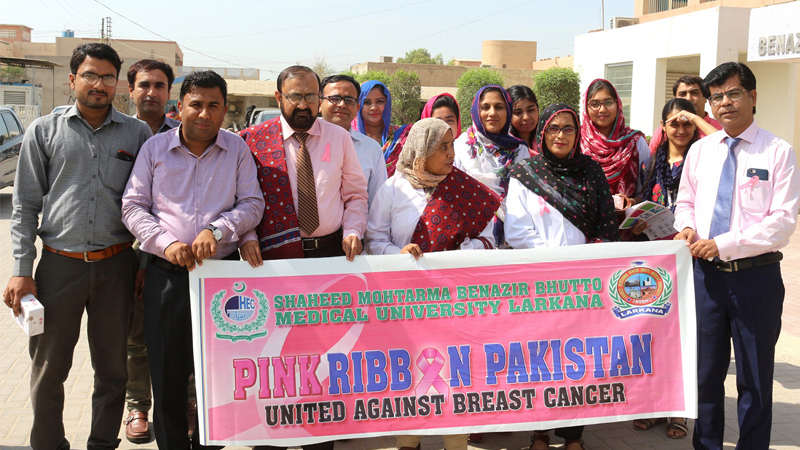40,000 people die annually due to breast cancer in Pakistan, SMBBMU observes


In light of October being the Breast Cancer Awareness month, the Shaheed Mohtarma Benazir Bhutto Medical University (SMBBMU) and its constituent Chandka Medical College (CMC) on Wednesday organised a a Pink Ribbon Walk to raise awareness, early detection and treatment as well as palliative care of the deadly disease and promote donations for breast cancer research.
In this regard, millions of passionate people around the world annually make effective efforts to sensitise more people about breast cancer and raise money in the way that they can.
Reportedly, senior doctors, paramedical staff, students and members of civil society marched from the Shahnawaz Bhutto Memorial Library to the CMC where a seminar on “Breast Cancer: its prevention and early detection in females” was organised.
Meanwhile, Gynecology and Obstetrics department Dean Prof Dr Rafia Baloch, CMC Principal Prof K Das, Prof Dr Ghulam Murtaza Pathan, Dr Sara Fatima and others addressed participants.
Prof Rafia Baloch apprised participants that following Rawalpindi, Larkana was the only city where ‘Tumor Boards’ were being held regularly including bone cancer, gynecology cancer, urology cancer and surgery cancer.
“Major causes of cancer are fast food, soft drinks, lack of exercise and unhygienic food consumption,” she said, adding that nowadays women have been avoiding breastfeeding which could also be a cause of breast cancer.
She asserted that in foreign countries, working mothers have been keeping their breast milk in freezers for children before leaving for their jobs.
Dr Sara Fatima said that according to a latest research, cancer could be treated, but ‘prevention is better than cure.’
She revealed that aged unmarried women (having no children) were more likely to be affected by breast cancer.
She stated that one percent men were also infected by breast cancer.
She said rural women used to visit hospitals at their last stage of cancer due to lack of awareness.
She advised women that if they were between 35-54 years old, they should get mammograms.
The speakers further asserted that about 40,000 patients have been dying annually due to breast cancer in Pakistan, and one out of every nine women is at the risk of breast cancer, the prevalence of which is the highest amongst all cancers in Pakistan.
Female medical students attended the seminar while wearing pink scarfs.
Rice growers dissatisfied over paddy crops’ rate amid rupee devaluation
Despite of shocking increases in the prices of basic commodities and following a record devaluation of the rupee against the dollar, rice growers in Sindh have not been compensated and were forced to accept the last year’s rate for the fresh paddy crops.
In this regard, Sindh Chamber of Agriculture representative Syed Siraj Rashdi and growers including Hanif Kertyo, Ghulam Sarwar Mangnejo, Ali Muhammad Abro and others told the media on Wednesday that the 45-day delay in release of irrigation water in water channels had severely affected about 50 percent of the total paddy crops in Sindh.
“Therefore, rice production has been reduced to nearly half as compared to previous year,”
They expressed profound concerns over the crippling financial situation in the country, and said that rupee devaluation has caused prices of diesel and petrol to increase while farmers were being offered the last year’s rate between Rs 800-900 per 40 kilos for wet paddy, and Rs 1,000-1,100 per 40 kilos for dry.
“Rice millers and traders are killing us economically,” they said, adding that 60 to 70 Maund of paddy crop was yielded per acre while the price of the production was calculated Rs 60,000- 70,000.
“If expenditure of sowing paddy saplings is calculated accurately including fertilizer, urea, seed etc, and is compared to the rate being offered to us, then it can be observed that one-fourth of rice production is being paid to farmers,” they said.
They said that if the current state of affairs was continued, then peasants and their families would soon be facing situation alike drought-hit areas of Tharparkar and Kacho.
They alleged that the government has increased rates of rice to benefit traders while neglecting poor peasants for many years.
They appealed to the government to fix rates of rice between Rs 1,300 to 1,500 per 40 kilos or otherwise, they would be ruined economically.
They further alleged that price of about two to four kilos from every 40 kilos of rice was being deducted by rice millers, and demanded the government to restrict them.
Published in Daily Times, October 18th 2018.
Recent Posts
- World
Spain and Portugal recover from worst-ever blackout, terror link under probe
Spain and Portugal have restored power after suffering a massive blackout, affecting millions and halting…
- Sports
Younis Khan praises Mohammad Amir’s smart bowling against Babar Azam
Former Pakistan captain Younis Khan praised Mohammad Amir for his clever dismissal of Babar Azam…
- Lifestyle
‘Sunrise on the reaping’ to reveal Haymitch’s dark past in New hunger games movie
Lionsgate has announced its next Hunger Games film, Sunrise on the Reaping, set to release…
- World
Man killed after chanting ‘Pakistan Zindabad’ during cricket match in India
A man in Mangaluru, India, was killed after allegedly chanting "Pakistan Zindabad" during a local…
- World
Israeli families urge return of loved ones’ remains from Gaza
Israeli families are pleading for the return of the bodies of hostages killed and held…
- Sports
Hasan Ali credits fitness and focus for strong PSL 10 performance
Hasan Ali is leading the bowling charts for Karachi Kings in PSL 10 with 13…
Leave a Comment